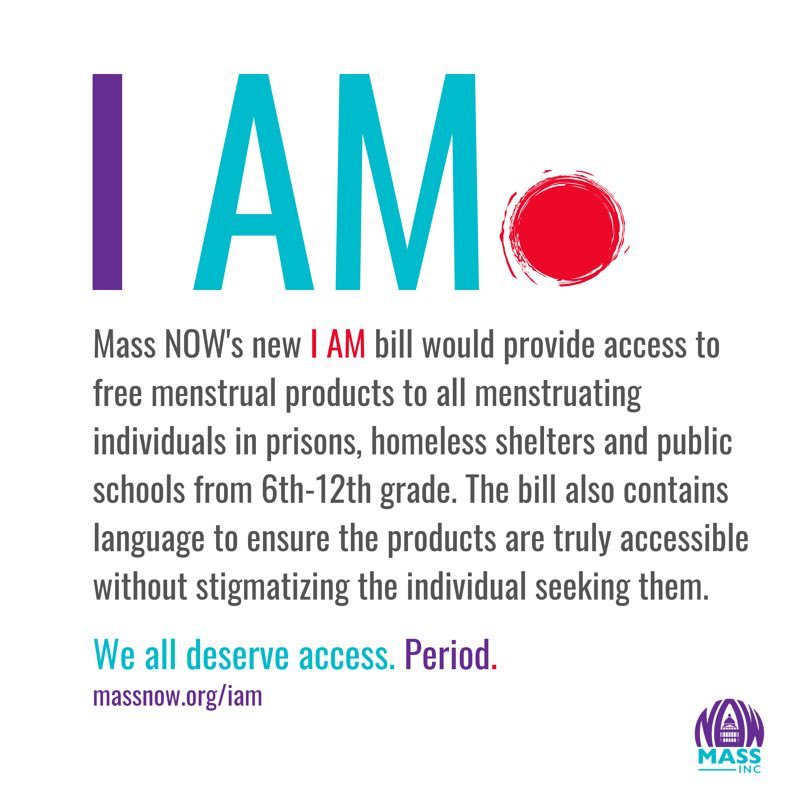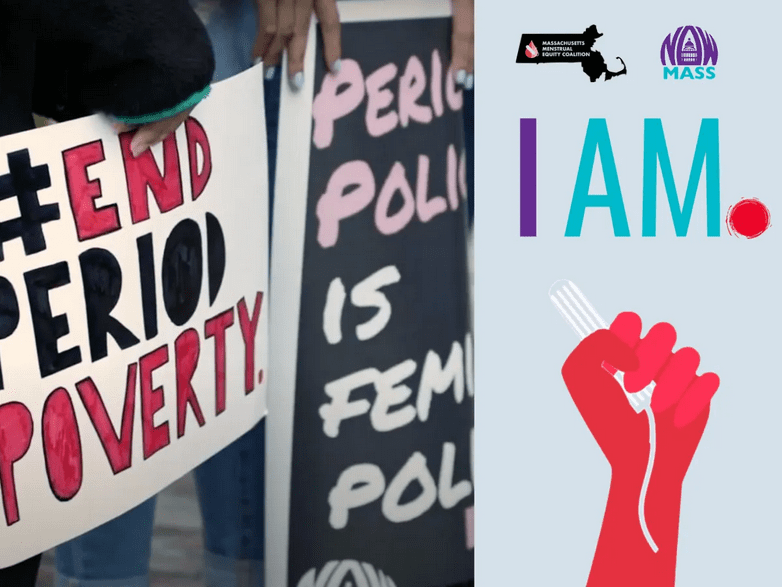Table of Contents
Updated on March 1, 2024
Massachusetts I AM Bill For Menstural Equity – Introduction
Menstrual Equity focuses on ensuring everyone can access menstrual products and education, a crucial part of gender equality and public health.
The period poverty bill in massachusetts, “I AM Bill (S.2491/H.534)” is a significant step towards ending period poverty by mandating free menstrual products in schools, shelters, and prisons.


Officially called “An Act to Increase Access to Disposable Menstrual Products in Prisons, Homeless Shelters, and Public Schools,” this bill aims to offer menstrual products for free in public places, helping people manage their periods with dignity and without worrying about cost.
Recent studies on percentage of people in period poverty shows that 1 in 4 women struggle to afford menstrual products due to financial constraints, impacting their participation in educational and social activities.
According to the Massachusetts Menstrual Equity Coalition, a group of activists and organizations working to end “period poverty,” one in seven children in the state, or 14%, lives in poverty and struggles to pay for menstrual products. The poverty rate is higher in New Bedford, nearly 19%, per census data. – Source
Why Did the Government Begin to Require Free Access to Menstrual Products?
The push for free access to menstrual products emerged from a growing recognition of menstruation as a natural, yet unaddressed, aspect of public health and gender equality.
Governments began mandating free access to address the “period poverty” that affects individuals who can’t afford menstrual products, leading to health risks, missed educational and work opportunities, and increased stigma around menstruation.
Understanding the Drive for Free Period Products in Massachusetts
An Act to Increase Access to Menstrual Products in Prisons, Homeless Shelters and Public Schools (H.2354 & S.1445
The I AM Bill, known formally through its Senate (S.2491) and House (H.534) versions, represents a landmark move in Massachusetts’ legislative efforts to combat menstrual inequity.
This bill, championed by lead sponsors Senator Jehlen, Representative Livingstone and Representative Barber, would ensure access to free menstrual products to all menstruating individuals in public schools, homeless shelters and incarcerated facilities. – mmecoalition.com/iam-bill
Having been unanimously passed by the State Senate, on March 3, 2022. The bill now awaits approval from the House, a critical next step towards its enactment.
This progression underscores Massachusetts’ dedication to eradicating period poverty and bolstering menstrual health and dignity for over 500,000 menstruating individuals in public institutions across the state.
Why There Was An Urgent Need for Legislative Action
Period poverty affects a significant portion of the menstruating population in Massachusetts, creating barriers to education, employment, and social engagement.
The financial hardship associated with purchasing menstrual products places individuals at risk of health complications and exacerbates the stigma surrounding menstruation.
Recognizing menstrual products as essentials, not luxuries, the I AM Bill seeks to address these challenges head-on.
Key Provisions of the I AM Bill
With a focus on public schools, correctional facilities, and homeless shelters, the bill mandates the provision of free menstrual products, aiming to ensure that no one is left behind due to menstrual inequity.
This legislation not only aims to alleviate the financial burden associated with purchasing these products but also seeks to dismantle the societal stigma attached to menstruation, promoting a more inclusive and equitable community.
Anticipated Impact of I AM Bill on Massachusetts Communities
The I AM Bill is set to significantly benefit Massachusetts communities, especially marginalized groups facing period poverty.
By improving access to menstrual products, the bill supports better health outcomes, educational opportunities, and dignity for menstruating individuals.
Research indicates that approximately 20% of students have missed school due to lack of access to menstrual products, underscoring the need for initiatives like the I AM Bill. However, the journey is not complete.
As the I AM Bill moves through the Massachusetts legislative process, its passage in the Senate represents a crucial victory for menstrual equity advocates. This bill stands as a testament to the power of legislative action in addressing public health and gender equality issues.
How Free Menstrual Products Benefit Federally Regulated Employees
Implementing policies for free access to menstrual products significantly benefits federally regulated employees, driving forward workplace inclusivity and equality.
These measures alleviate the financial burden on employees, integrating menstrual hygiene into the core of workplace health and safety standards.
This approach fosters a work environment that proactively addresses and diminishes gender-based disparities.
By ensuring menstrual products are freely available in washrooms, organizations signal their commitment to supporting all employees’ health and dignity, reinforcing an equitable and respectful workplace culture.
Breaking Barriers: The Importance of Free Access to Menstrual Products for Public Health and Gender Equality”
Free access to menstrual products is crucial for promoting public health, dignity, and gender equality. It ensures that all menstruating individuals can participate fully in society without the barriers imposed by period poverty.
This access is not just about the products; it’s about challenging and changing the stigma around menstruation, ensuring that educational opportunities are not missed, and fostering a society that respects and supports bodily autonomy.
5 Startling Facts About Menstrual Equity and the Need for Free Period Products”
Global Impact: Over 500 million individuals worldwide lack adequate facilities for menstrual hygiene management.
Education at Risk: Students who lack access to menstrual products miss an average of 20% more school days than their peers.
Workplace Productivity: Period poverty affects the productivity of 1 in 10 workers who menstruate, highlighting the need for workplace accommodations.
Health and Hygiene: Lack of proper menstrual hygiene increases the risk of reproductive and urinary tract infections.
Economic Barriers: The “pink tax,” or the higher cost associated with female-specific products, including menstrual products, imposes an additional financial burden on those who menstruate.
Relevent Stats –
- 86% of women have started their period in public without the supplies needed – Aunt Flow
- 70% of menstruators have missed school or work because of their period – Canadian Public Health Association
- 1 in 5 girls, women and people who menstruate in Canada struggle to afford menstrual products – Plan International
- More than 4 in 5 menstruators (83%) believe period products are too expensive – Government of Canada
- 75% of menstruators believe that period products should be offered free EVERYWHERE to ALL menstruators, all the time – Citron Hygiene
Citron Hygiene’s Role in Menstrual Hygiene Compliance
Citron Hygiene plays a vital role in helping Massachusetts organizations comply with the new menstrual legislation by offering comprehensive menstrual hygiene solutions.
Our expertise is crucial in ensuring institutions meet the bill’s requirements effectively and efficiently. In regions where similar menstrual hygiene programs have been implemented, institutions saw a 30% increase in compliance with health standards within the first year.
Advocating for Change: Future Steps and Considerations
Your support for menstrual equity is crucial. We encourage everyone, from individuals to organizations, to advocate for the bill and similar efforts. The legislative process for the I AM Bill, including its passage and implementation, are key steps forward.
Providing free period products in your workplace
If you’re looking to create a more period positive space in your workplace washrooms, you’ve come to the right place.
Here are three steps to get started:
- Tampon and Pad Dispensers: Learn how the Aunt Flow Menstrual Product Dispenser works to provide organic, sustainable free-vend tampons and pads in your business. Discover Aunt Flow.
- Sanitary Disposal Units: Upgrade your tampon and sanitary napkin disposal units to offer a dignified, touch-free and hygienic solution in each bathroom stall. Explore Sanitary Disposal Units.
- Talk with an Expert: Book a free, no-obligation consultation with our certified technicians who can help you learn more about how to create a period positive space in your washroom. Book a consultation to ensure you are compliant for I AM Bill legislation.
Menstrual Equity Bill Massachusetts – FAQs
What is the I am bill?
The I AM Bill seeks to provide free menstrual products in public institutions, addressing menstrual equity and public health in Massachusetts and reducing financial burdens.
Is there a period tax in Massachusetts?
Massachusetts does not impose a specific “period tax,” but the broader issue of the “pink tax” affects menstrual product affordability.
What is the period poverty law?
The period poverty law, or the I AM Bill, ensures free access to menstrual products in public institutions to support menstrual equity.
How serious is period poverty?
Period poverty significantly impacts education, health, and workplace productivity, marking it as a serious issue.
What does period poverty look like?
Period poverty entails lack of access to menstrual products, leading to missed educational and work opportunities.
Is period poverty a public health crisis?
Yes, period poverty is recognized as a public health crisis due to its impacts on health, dignity, and participation in society.
What is menstrual equity?
Menstrual equity ensures equal access to menstrual products, education, and the right to manage menstruation without stigma.
Who benefits from the I AM Bill?
Over 500,000 menstruating individuals in Massachusetts, especially in marginalized communities, benefit from the I AM Bill’s provisions.
How does lack of access to menstrual products affect education?
Lack of menstrual products leads to a 20% increase in school absences among students, impacting education and opportunities.
What role does Citron Hygiene play in menstrual hygiene compliance?
Citron Hygiene supports organizations in meeting the I AM Bill’s requirements by providing comprehensive menstrual hygiene solutions, improving compliance by 30% in similar programs.
Will people take too many tampons?
Our experience at Citron Hygiene shows that no, people don’t take too many tampons from free tampon dispensers. Similar to how you offer toilet paper for free, people will use as much as they need.
Related posts:
- Period Dignity Survey – High Demand for Free Period Products in Washrooms
- Why Period Products Should Be Free?
- Free the Tampon Initiative For Freely-accessible Menstrual products
- Free Menstrual Products: What You Need To Know About The New Legislation Changes in Canada
- Infographic: Metal Wall Boxes VS. Touch-Free Menstrual Disposal
- Period Dignity in Public Bathrooms: No More Metal Blood Boxes
- Boost Your Business with Period-Positive Washrooms: Inclusivity Leads to Success
- How To Combat Period Poverty This Holiday Season
